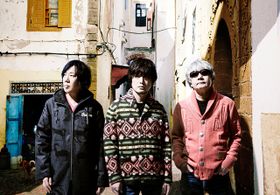Difference between revisions of "generasia:Featured article for 2018 week 38"
Supermel0n (talk | contribs) (Created page with "thumb|280px|the pillows promoting ''[[Rebroadcast|REBROADCAST'' (2018)]] ===the pillows=== <div align="justify"> '''the pillo...") |
Supermel0n (talk | contribs) m |
||
| Line 9: | Line 9: | ||
In 1994, the band once again moved, this time to [[KING RECORDS]], and released ''[[Kool Spice|KOOL SPICE]]'', their major-label debut. With Ueda no longer in the band, the pillows' style started slowly drifting away from their minimalist rock sound, and wildly experimented between varying styles. ''Kool Spice'' contained everything from warbling blues rock to elevator music; the 1995 release ''[[Living Field|LIVING FIELD]]'' included experiments in retro-pop and reggae. It was their grunge record, 1997's ''[[Please Mr.Lostman]]'' where the pillows finally got their groove. Preceded by a series of hit singles, and evocative of such American rock bands as [[wikipedia:Weezer|Weezer]] and [[wikipedia:Pixies|Pixies]], it catapulted the band to mainstream success in Japan. After a wildly successful tour, the band proceeded to release three increasingly successful follow-up albums over the next two years: ''[[Little Busters|LITTLE BUSTERS]]'', ''[[Runners High|RUNNERS HIGH]]'', and ''[[Happy Bivouac|HAPPY BIVOUAC]]''. [[the pillows#Information|...]] | In 1994, the band once again moved, this time to [[KING RECORDS]], and released ''[[Kool Spice|KOOL SPICE]]'', their major-label debut. With Ueda no longer in the band, the pillows' style started slowly drifting away from their minimalist rock sound, and wildly experimented between varying styles. ''Kool Spice'' contained everything from warbling blues rock to elevator music; the 1995 release ''[[Living Field|LIVING FIELD]]'' included experiments in retro-pop and reggae. It was their grunge record, 1997's ''[[Please Mr.Lostman]]'' where the pillows finally got their groove. Preceded by a series of hit singles, and evocative of such American rock bands as [[wikipedia:Weezer|Weezer]] and [[wikipedia:Pixies|Pixies]], it catapulted the band to mainstream success in Japan. After a wildly successful tour, the band proceeded to release three increasingly successful follow-up albums over the next two years: ''[[Little Busters|LITTLE BUSTERS]]'', ''[[Runners High|RUNNERS HIGH]]'', and ''[[Happy Bivouac|HAPPY BIVOUAC]]''. [[the pillows#Information|...]] | ||
| − | Their 22nd studio album, | + | Their 22nd studio album, ''[[Rebroadcast|REBROADCAST]]'', is released this week on September 19th. |
</div> | </div> | ||
[[Category:2018 Featured Articles]] | [[Category:2018 Featured Articles]] | ||
Latest revision as of 21:12, 17 July 2018

the pillows
the pillows (ザ・ピロウズ) are a Japanese rock band. The group has released 21 studio albums, several EPs and compilations, and over 35 singles. They are best known in the west for their music in FLCL, an anime series by Gainax and their song "Ride on shooting star" which was used as its ending theme song. Currently they are under the avex trax label.
the pillows formed in 1987, when the legendary '80s J-Rock band Kenzi & the Trips split up. Former Trips Ueda Kenji (Bass) and Sato Shinichiro (Drums) teamed up with Manabe Yoshiaki (Guitar), who had previously played for 80s hair-band Persia, and Yamanaka Sawao (Vocals). They signed on to Pony Canyon, and in 1991 released their first full album, MOON GOLD. In 1992, shortly after their second album, WHITE INCARNATION was recorded, Ueda left the band. He was never properly replaced; the band simply used a series of guest bassists in recording sessions and on tours.
In 1994, the band once again moved, this time to KING RECORDS, and released KOOL SPICE, their major-label debut. With Ueda no longer in the band, the pillows' style started slowly drifting away from their minimalist rock sound, and wildly experimented between varying styles. Kool Spice contained everything from warbling blues rock to elevator music; the 1995 release LIVING FIELD included experiments in retro-pop and reggae. It was their grunge record, 1997's Please Mr.Lostman where the pillows finally got their groove. Preceded by a series of hit singles, and evocative of such American rock bands as Weezer and Pixies, it catapulted the band to mainstream success in Japan. After a wildly successful tour, the band proceeded to release three increasingly successful follow-up albums over the next two years: LITTLE BUSTERS, RUNNERS HIGH, and HAPPY BIVOUAC. ...
Their 22nd studio album, REBROADCAST, is released this week on September 19th.